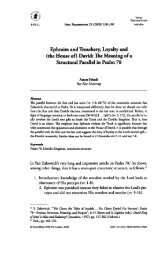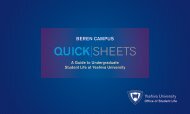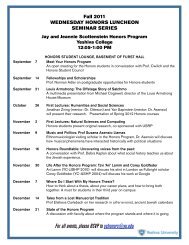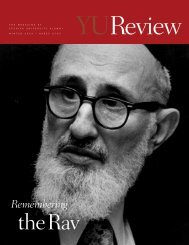26<strong>Richard</strong> C. <strong>Steiner</strong>each (verb) with qametz (instead of shewa, in the ,חָ רמנאfirst syllable) 87 so that it looks like the future.It seems clear from these sources that Rabbenu Tam’s disciplesreported that he read some of the verbs in <strong>Kol</strong> <strong>Nidre</strong> (the ones in theqal stem, possibly including (חרמנ 88 with qametz (instead of shewa)in the first syllable. This revocalization converted qal perfectsreferring to the past into qal participles referring to the future. In somesources, the tradition became garbled, and the vocalization withqametz was incorrectly extended to all of the verbs in <strong>Kol</strong> <strong>Nidre</strong>,.משתבענא includingThe testimony of several of the above sources concerning thecorrecting of maḥzorim is supported by the version of <strong>Kol</strong> <strong>Nidre</strong> foundin 18th century manuscripts from the Jewish communities of Asti,די נדירנא ודי מקדישנא ודי Italy): Fossano and Moncalvo (Piedmont,89 None of the .מקנימנא ודי מחרימנא ודי משתבענא ודי אסירנא על נפשנאother maḥzorim examined by Goldschmidt, including two manuscriptsא87The phrase כולו קמוץ is taken here as a Hebrew paraphrase of the Aramaicstatement attributed to Rabbenu Tam: הני לישני בקמץ קרינא להו .כולהו However,we cannot rule out the possibility that it means “with qametz in all syllables.”That is the meaning of the expression כולו קמוץ in Radaq’s commentaries to 2Sam 19:7, Isa 5:24, 32:19, and Hos 6:1. This alternative interpretation issupported by the faulty vocalization of the Aramaic participles יָדָ ע (Dan 2:22 =MT ע (יָדַ and פָּ לָח (Dan 6:17 = MT לַח (פָּ in Le Glossaire de Leipzig, 3:1481,נָטַ ע s.v. §19130 and 1511 §19578. So too Rashi, in his commentary to Job 14:9נָטָ shows that his text of Job had the faulty form88A number of authorities cited above have ,חרמנא in the qal stem: R. Bezalelb. Abraham Ashkenazi, R. Yom Tov b. Abraham Ishbili (Ritva), R. Aaron b.Jacob ha-Kohen of Lunel, and R. Nissim b. Reuben of Gerona (Ran). For theuse of this Aramaic verb in the qal participle חרים) “he bans” in a magic bowl),see Michael Sokoloff, A Dictionary of Jewish Babylonian Aramaic of theTalmudic and Geonic Periods (Ramat-Gan: Bar Ilan <strong>University</strong> Press, 2002),483b. Moreover, the Hebrew version, <strong>Kol</strong> Nedarim, also has the qal formaccording to a half dozen early manuscripts (including Genizah (חרמנו)fragments) recorded in Maagarim. This is significant because, as mentionedabove, there are good reasons to believe that the Hebrew version is older. Forעל ( Wallenstein in Pirqe de-Rabbi Eliezer, noted by Meir חרמו the qal form, Sinai 45 [1959], 307 note toline 27), see "ל (Warsaw, 1852), 90b §122..ננקד כולו קמץ when he writes עשניים מקטעי גניזת קהיר שב"ספריית ריילנדז" מנצ' סטרספר פרקי רבי אליעזר ... עם באור הרדמחזור לי89(ed. Daniel Goldschmidt), 2:opposite p. 1. The מים הנוראיםparticiple מקנימנא appears to be a denominative created as a counterpart of<strong>Nidre</strong>. at the beginning of <strong>Kol</strong> קונמיhttp://www.biu.ac.il/JS/JSIJ/12-2013/<strong>Steiner</strong>.pdf
צ(<strong>Kol</strong> <strong>Nidre</strong>: Past, Present and Future27from medieval France, 90 have anything similar. Since the Jews ofthese communities came there in the 14th century from France andpreserved the Northern French piyyuṭim of the high holiday liturgyuntil modern times, it seems likely that they preserved a NorthernFrench version of <strong>Kol</strong> <strong>Nidre</strong> reflecting the influence of Rabbenu Tam.3. The Fifth Verb in <strong>Kol</strong> <strong>Nidre</strong>As noted above, the tense of one of the verbs in the revised version of<strong>Kol</strong> <strong>Nidre</strong> is mentioned briefly already in Rabbenu Tam’s Sefer ha-Yashar. The passage is corrupt, but it can be reconstructed with thehelp of the citations and paraphrases by the later authors given below:Rabbenu Tam:כל נדרי דאמרינן בלילי יום הכפורים הגיה אבא מרי זצ"ל מיוםכפורים זה עד יום כפורים הבא עלינו לטובה כולהון דאיחרטנא"ל דאי־חרִ טנא) בהו וכן עיקר.... דאיתחרטנא (צ"ל דאי־חרִ טנא)להבא משמע כדאמרי' בברכות (ו)יהיו לרצון אמרי פי משמע דאמריומשמע דאמינא. ופי' דאיחרטנא (צ"ל דאי־חרִ טנא) כלומר שנזכרבתנאי של ראש [השנה] לאחר [הנדר] ונתחרט ויהא מותר.92<strong>Kol</strong> <strong>Nidre</strong>, which we say on Yom Kippur night—my lordfather corrected (it to read): “from this Yom Kippur to(next) Yom Kippur, coming (we pray) favorably upon us—all of those, if I shall regret them (shall be released),” andthat is the true (version).... The form דאי־חרִ טנא refers to thefuture as we say in Berakhot (9b): “‘Let the words of mymouth be acceptable’ (Ps 19:15)—it means ‘what I said’and it means ‘what I shall say.’” And as for the meaning of9190For a description of the two manuscripts, one in Parma and the other in.נג:1 ,מחזור לימים הנוראים Geneva, see91The point of this talmudic proof text is not entirely clear. It may be cited toshow that a single phrase can refer either to the past or the future. Or it maycited to show that a first person singular participle such as מינא can refer toיהיו לרצון אמרי פי משמע the future. It should be noted, however, that the readingis not attested in the surviving manuscripts of Ber. 9b. The דאמרי ומשמע דאמינאclosest match is לרצון אמרי פי משמע דאמרי ומשמע דבעינא למימר ,יהיו attested inthree manuscripts in the Talmud Text Databank (Paris 671, Florence II-I-7, andיהיו לרצון Oxford - Bodl. heb. b. 10 (2833) 6-7). Another three manuscripts havea reading very close to that of our printed ,אמרי פי משמע מעיקרא ומשמע לבסוףedition (92§100. 70-71 ,ספר הישר Tam, R. Jacob b. Meirא.(יהיו לרצ ון אמרי פי משמע לבסוף ומשמע מעיקראhttp://www.biu.ac.il/JS/JSIJ/12-2013/<strong>Steiner</strong>.pdf
- Page 1: JSIJ 12 (2013) 1-45KOL NIDRE: PAST,
- Page 4 and 5: 4Richard C. Steinerנוהגים ה
- Page 6 and 7: 6Richard C. SteinerThe recitation o
- Page 8 and 9: 8Richard C. SteinerMy lord father c
- Page 10 and 11: 10Richard C. SteinerIn the name of
- Page 13: Kol Nidre: Past, Present and Future
- Page 16 and 17: 16Richard C. Steineruntil I come ba
- Page 19 and 20: צ(Kol Nidre: Past, Present and
- Page 21 and 22: Kol Nidre: Past, Present and Future
- Page 23 and 24: Kol Nidre: Past, Present and Future
- Page 25: Kol Nidre: Past, Present and Future
- Page 29 and 30: צ(Kol Nidre: Past, Present and
- Page 31 and 32: Kol Nidre: Past, Present and Future
- Page 33 and 34: Kol Nidre: Past, Present and Future
- Page 35 and 36: Kol Nidre: Past, Present and Future
- Page 37 and 38: Kol Nidre: Past, Present and Future
- Page 39 and 40: Kol Nidre: Past, Present and Future
- Page 41 and 42: Kol Nidre: Past, Present and Future
- Page 43 and 44: Kol Nidre: Past, Present and Future
- Page 45 and 46: Kol Nidre: Past, Present and Future







